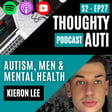
The Crushing Reality Of Late-Diagnosed Autism
What barriers face late-diagnosed autistic individuals? Do autistic people really have support for employment? What options do autistic people have for finding friendship and love?
Pedro Ferreria is a late-diagnosed autistic adult with a passion for retro video games and a voice to share. He describes himself as ‘falling through the cracks’, facing challenges in friendship, independence, romance, and employment throughout his 40 years.
My Links - https://linktr.ee/thomashenleyUK
Dbud Noise Cancelling Adjustable Ear Buds (20% Off with code: THOUGHTYAUTI) - https://dbud.io/thoughtyautipodcast
They kick things off by speaking about Pedro’s recent 40th birthday, and the two bond over their unique difficulties with their birthdays.
Diagnosed dyslexic, undiagnosed dyspraxic, and recently diagnosed autistic at the age of 37, Pedro takes us through his early life experiences and his love for retro video games.
Pedro is yet to learn to drive or move out of home, struggling immensely with finding a stable and fulfilling job to fuel his independence. He had a job for a number of years but eventually became too taxing due to the 3-hour roundtrip involved.
He’s never felt competent in life, being shuttled down the volunteer routes, and palmed off by places of employment that claim to be Disability Confident. Thomas talks about the lack of post-18 support available to Autistic adults, and what unique challenges social life as an adult brings. Andy’s Man Club was transformative for Thomas’ close friend.
In the conversation about dating, Thomas speaks on matching-making services, going to groups, and dating apps. Pedro found no luck with these methods and is still seeking a partner.
Bullying has always been commonplace in his life, whether it’s constant negativity from family, school bullies, workplace bullies, and online harassment. Consequently, he’s developed low self-esteem and an anxiety disorder which makes life difficult. They speak on Pedro’s experience of online harassment following the Intellivision Amigo controversies, where he’s been stalked, had his tweets posted to Discord servers, and had his face photoshopped as a clown.
Pedro describes himself as an ‘old man shouting at the clouds’ and opens up about his overall experience as an unsupported Autistic adult in our modern world.
Song Of The Day (Listen Here) - https://open.spotify.com/playlist/5UDIyN5TSYN4zMcRoQPrG8?si=9255ed3480d840b5
Interview me, 1:1 Talk With Thomas, public speaking for events & workplace training - https://linktr.ee/thomashenleyUK



















